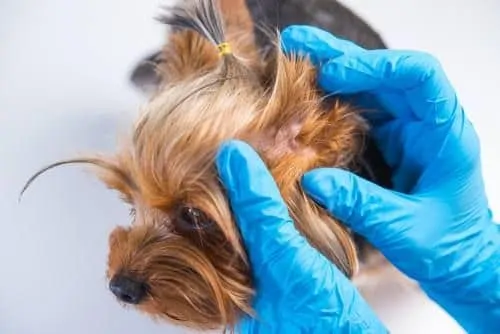Ear mites are a relatively common condition for pets. These tiny creatures are in the arachnid family, just like ticks and spiders. Ear mites do not feed on blood the way that ticks do. Instead, they feed on the wax and oils in your pet's ears, causing the ears to itch. Although the mites do not bite, they can still be harmful due to the excessive scratching causing damage to your pet's ears. Dr. Lifsey at University Parkway Animal Hospital in Jackson, TN, treats ear mites in dogs and cats.

The Symptoms of Ear Mites
Ear mites cause several symptoms. These include:
- Scratching: The first symptom of ear mites is excessive scratching. When the ear mites feed on the wax and oils in your pet's ears, it causes a severe itching sensation. If your pet is excessively scratching its head or ears, it could have ear mites.
- Dark, crumbly discharge: If there is dark, crumbly discharge, similar to the appearance of coffee grounds coming from your pet's ears, it is a sign of a serious ear mite infestation. The discharge is dried blood due to your pet scratching at the ear mites.
- Wounds: If your pet has scabs or abrasions at the base of the ear, it could have ear mites. Most pets will use the claws on their hind legs to scratch, which can cause abrasions over time. If the problem is not treated, the wounds can become infected, putting your pet's health at risk.
- Invading other body parts: If your pet's ear mite infestation becomes severe, the mites can enter other parts of the body, which can be very dangerous.
Treating Ear Mites Treated
You can find DIY home remedies for ear mites online, however, these remedies do not always work. If you suspect your pet has ear mites, it is best to schedule an appointment with your veterinarian. The first thing our vet will do is inspect your pet's ear canals with an otoscope. We will check for the presence of mites and discharge from the ear canals.
If we determine that your pet has ear mites, we will clean the ears thoroughly before administering some medication. The most common forms of medication used are moxidectin and selamectin, which are used to treat many types of parasites. Dr. Lifsey will also check for the presence of bacterial or fungal infections that may require treatment.
Get Treatment for Your Pet’s Ear Mites in Jackson, TN
If you suspect your dog or cat has ear mites, schedule an appointment at University Parkway Animal Hospital immediately. The longer you wait, the worse the infestation will become, and the risk of an infection increases. Call our team today at (731) 661-0711 or reach us through our website by using our online contact form.
